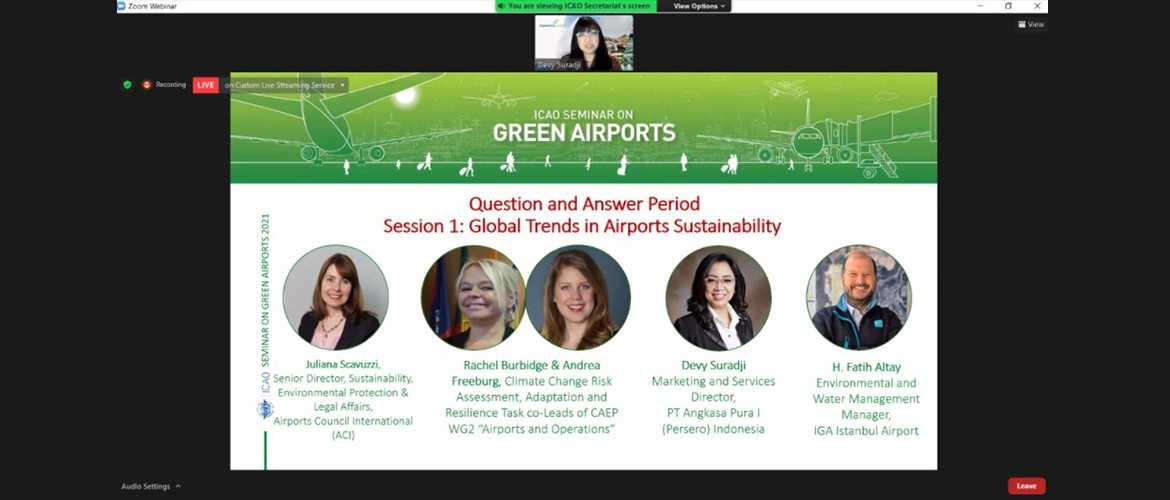01 Dec 2021
Back to List
JAKARTA - Angkasa Pura Airports is an airport operator with an environmental vision and is always committed to making a positive contribution to environmental sustainability in conducting its business operations, including through the implementation of the green airport concept at its airports.
The successful implementation of the green airport or eco-airport at AP I’s airports was recognized by the International Civil Aviation Organization (ICAO) under the United Nations, Angkasa Pura Airportsparticipated as the speaker at ICAO Seminar on Green Airports organized by ICAO on November 29-30, 2021 virtually. At the seminar, Angkasa Pura Airportswas represented by Marketing and Services Director Devy Suradji delivering material on “Developing Sustainability for Airports in Indonesia through Innovation, Participation, and Reaching Out to the Communities”.
“Sustainable business practices that pay attention to environmental and social aspects are one of the focuses of PT Angkasa Pura Airportsin accordance with the company’s mission. The company made environmental policy as an endeavor to respond to the stakeholders’ needs and expectations by providing eco-friendly services and complying with various environmental regulations, being a role model for disciplined behavior and developing creative ideas related to airport environmental management and protection, as well as preventing environmental pollution while increasing sustainable efforts through the development of green buildings, waste management, green procurement, green processes, reduce-reuse-recycle programs, habitat management, energy conservation, external and internal audits,” AP I’s Marketing and Services Director, Devy Suradji said.
As an airport development and management company, Angkasa Pura Airportsoperates based on various environmental regulations, including the Regulation of the Minister of Public Works and Public Housing of the Republic of Indonesia No. 21/2021 on Performance Assessment of Green Buildings, Regulation of the Director General of Civil Aviation No. SKEP/124/VI/2009 on Guidelines for Implementation of Environmentally Friendly Airports (Eco-Airports), Regulation of the Minister of Energy and Mineral Resources No. 12 of 2018 on Implementation of Physical Activities of Utilization of New Energy and Renewable Energy and Energy Conservation, and various other regulations.
The various regulations are incorporated into the company’s internal policies, including guidelines for toxic and hazardous waste management, guidelines for the development of green buildings at airports, guidelines for implementing ISO 14000:2015 Environmental Management Systems, and measures to reduce greenhouse gas emissions.
The implementation of eco-airport initiatives and an effective environmental management system have been carried out through the implementation of environmental management system using the ISO 14001 approach where almost all managed airports have received the ISO 14001 certificate; further implementation of habitat management or biodiversity studies as programs to control wild animals at airports; waste management programs including liquid and solid waste management; socializing the green airport program to tenants and aircraft passengers (such as reducing the use of plastic straws for restaurant tenants and reducing the use of plastic shopping bags).
In relation to efforts to reduce greenhouse gas emissions, several initiatives taken by AP I are the implementation of green airport standardization including the establishment of green buildings/airports (Yogyakarta International Airport in Kulon Progo and Jenderal Ahmad Yani Airport in Semarang), green construction, and green procurement; greenhouse gas recording through Airport Carbon Emission Rating Tools (ACERT); emission mitigation through the use of LED lighting, sensor systems, building automated systems, and tree planting.
For information, Yogyakarta International Airport (YIA) in Kulon Progo won a Gold Greenship certificate from the Green Building Council Indonesia (GBCI). YIA is the first and only airport in Indonesia with a Gold Greenship Building certificate. In its operational activities, YIA is supported by various utility devices to support eco-friendly concepts, including the use of LED lights, elevators, lifts, and travelators with sleep mode feature, sanitary ware with dual flush and auto faucet features, as well as the use of Sunergy Green building glass which is able to reflect sunlight properly and supports the efficient use of air conditioning in the terminal area. YIA is also supported by a stormwater management facility that functions to capture, collect, process, and absorb rainwater to be used as an alternative water source to support airport operational needs.
In relation to the implementation of energy conservation, AP I uses solar panel systems in several areas, uses biofuels or other materials related to renewable energy, reduces electricity consumption by using a building automatic sensor system and magnetic cooling. In 2021, I Gusti Ngurah Rai Airport in Bali became the first AP I’s airport to implement ISO 50001:2018 Energy Management System. Through the implementation of the energy management system, the airport can make energy savings or efficiency to contribute to reducing greenhouse gas (GHG) emissions. The implementation of the energy management system at I Gusti Ngurah Rai Airport in Bali as of December 2021 has the potential to generate energy savings of 3,627,686 Kwh or equivalent to Rp4,309,691,285. In addition to the benefits of energy savings, energy management at Bali Airport also has the potential to reduce GHG emissions by 2,866 tons CO2/MWh.
“Realizing sustainability is an endless effort given the different landscape conditions in business areas and changing consumer behavior. Therefore, collaboration and cooperation are needed to realize sustainable goals in the aviation sector, not only by involving stakeholders in the industry but also all stakeholders outside the aviation industry,” Devy Suradji said.
Up
